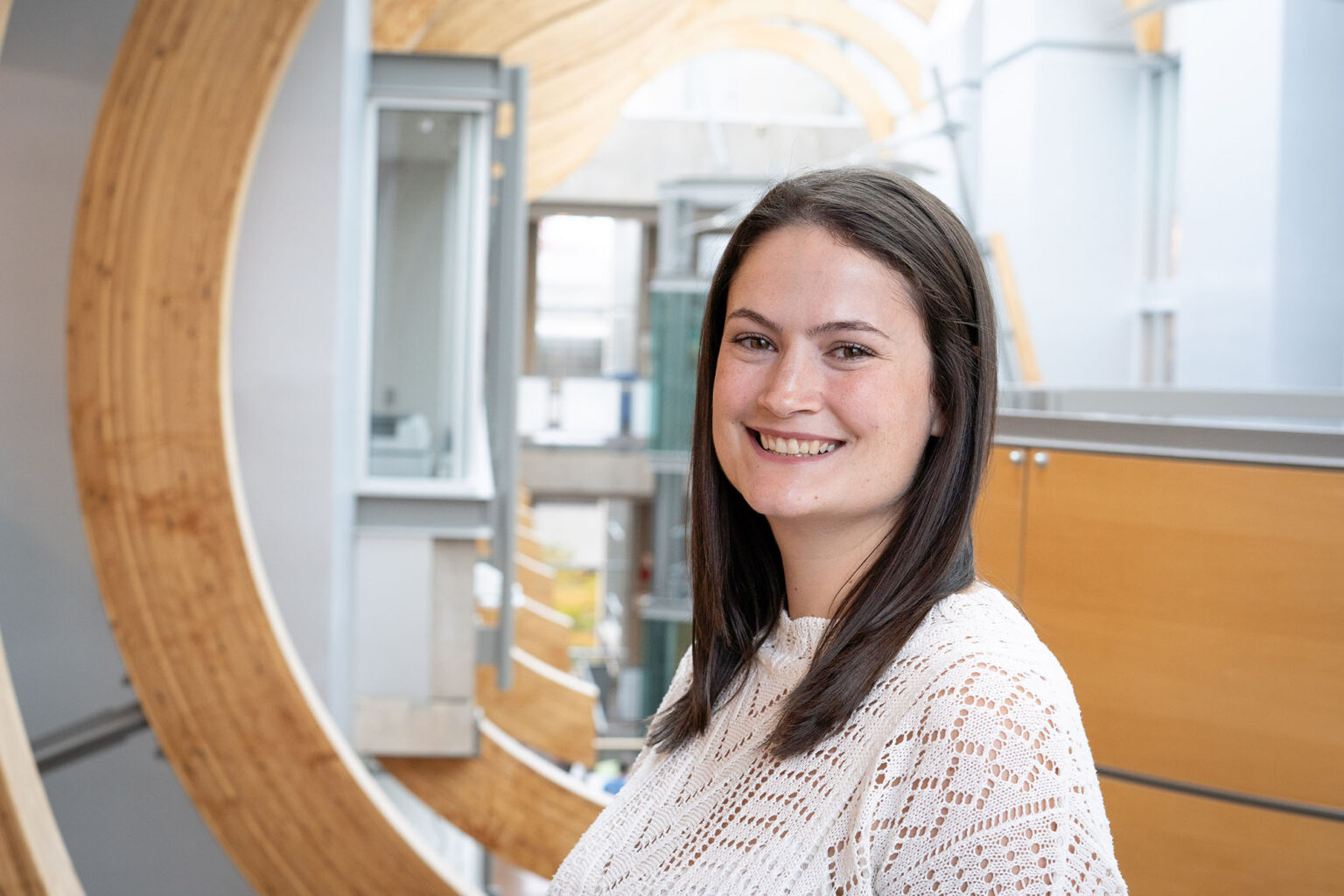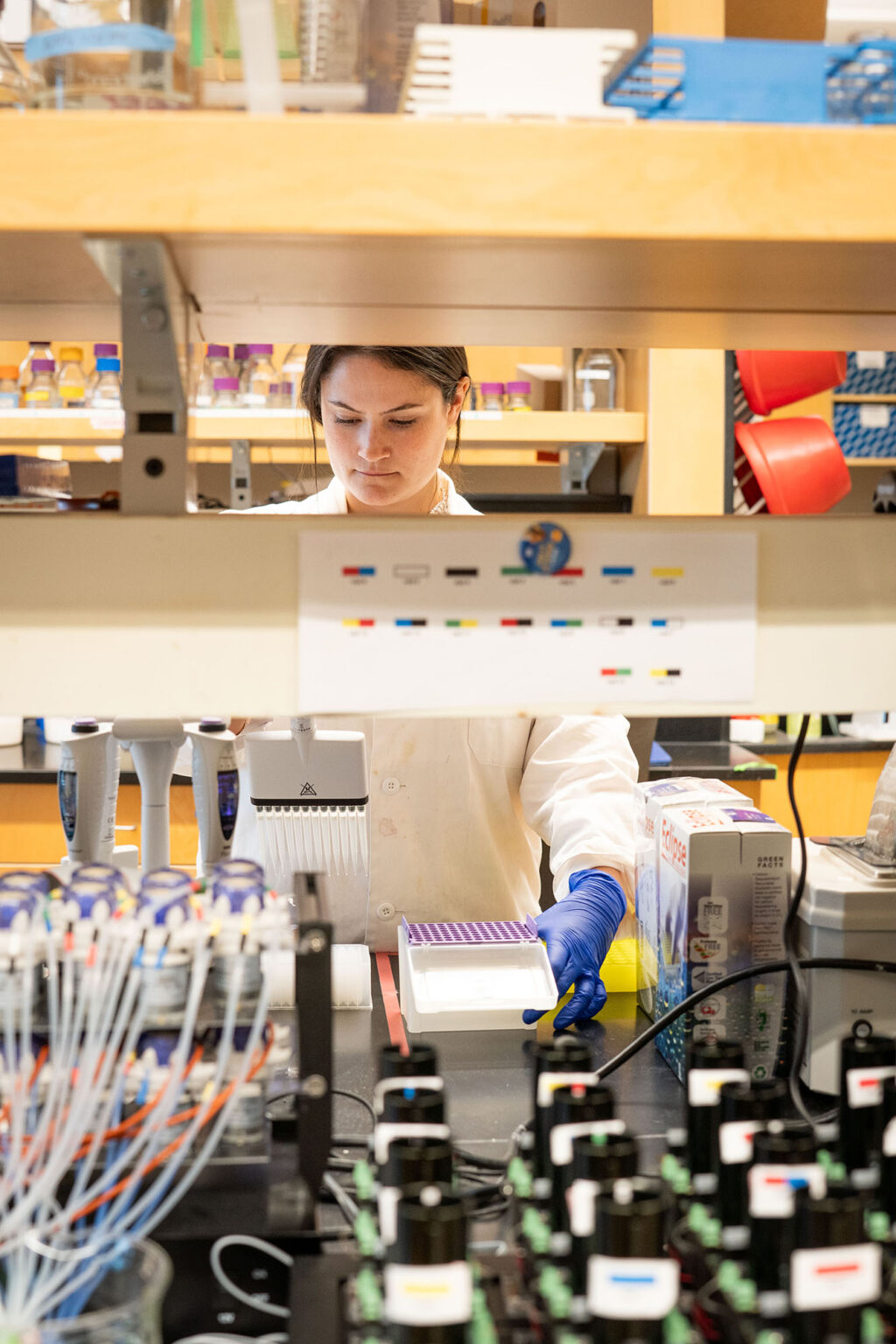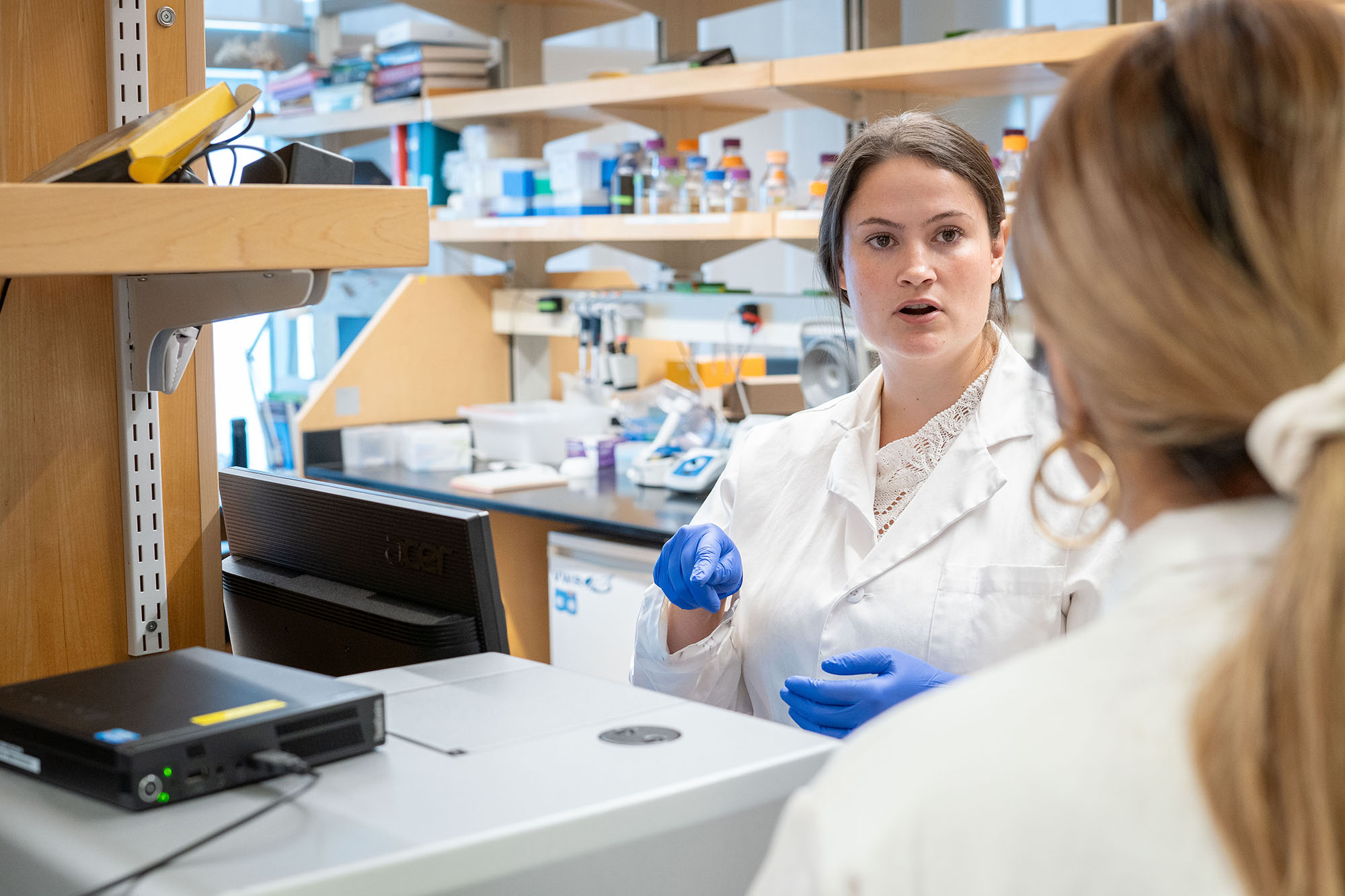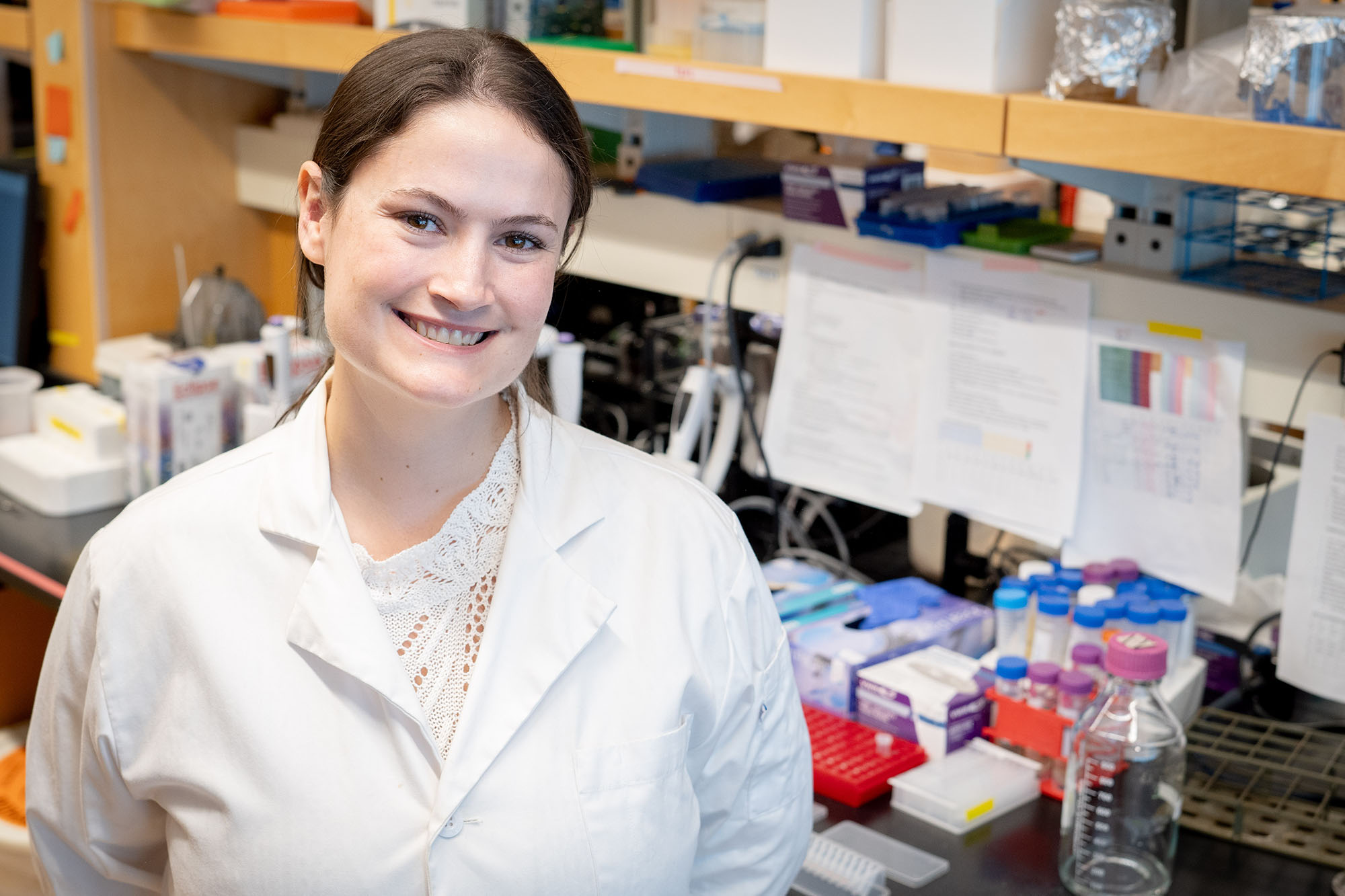Awards and recognition
Dr. Emily Bordeleau is Awarded the Killam Postdoctoral Research Fellowship
 It is with great excitement we congratulate Dr. Emily Bordeleau on being awarded the Killam Postdoctoral Research Fellowship. Dr. Bordeleau, a postdoctoral fellow in the Tokuriki lab, is an exceptional biochemistry and molecular biology researcher with a focus on a holistic exploration of antibiotic resistance. The prestigious Killam Postdoctoral Research Fellowship is awarded to up to 5 outstanding scholars across the University of British Columbia each year. This award was established in memory of Izaak Walton Killam by his wife Dorothy Johnston Killam and is intended to support advanced research and education. Mrs. Killam wished that those selected to receive fellowships: “…be likely to contribute to the advancement of learning or to win distinction in a profession. A Killam scholar should not be a one-sided person… Special distinction of intellect should be founded upon sound character”.
It is with great excitement we congratulate Dr. Emily Bordeleau on being awarded the Killam Postdoctoral Research Fellowship. Dr. Bordeleau, a postdoctoral fellow in the Tokuriki lab, is an exceptional biochemistry and molecular biology researcher with a focus on a holistic exploration of antibiotic resistance. The prestigious Killam Postdoctoral Research Fellowship is awarded to up to 5 outstanding scholars across the University of British Columbia each year. This award was established in memory of Izaak Walton Killam by his wife Dorothy Johnston Killam and is intended to support advanced research and education. Mrs. Killam wished that those selected to receive fellowships: “…be likely to contribute to the advancement of learning or to win distinction in a profession. A Killam scholar should not be a one-sided person… Special distinction of intellect should be founded upon sound character”.
Bordeleau completed her B.Sc. and M.Sc. degrees in Biotechnology at Brock University in St. Catharines, Ontario. After several co-op placements working with the agricultural industry fighting different plant pathogens, she knew she had found a key piece to her career puzzle.
“I found a passion with antibiotic resistance research. It is a really nice crossover between investigative science and working on real world problems that will help people,” explains Bordeleau.
 She went on to study at McMaster University, completing her PhD in Biochemistry in 2022. Bordeleau’s work was focused on infectious disease research, understanding mechanisms of drug resistance and how they inactivate antibiotics. Inspired by her time working with farming and agricultural groups, she decided to pursue research in support of ‘One Health’ initiatives that recognize the connections between human health and the environment. Together they inform the surveillance of the antibiotic resistance mechanisms in nature that pose a threat to human health. Wanting to broaden her toolkit towards these goals, she joined Dr. Nobu Tokuriki’s lab to learn different bioinformatic tools for examining the problem of antibiotic resistance through an evolutionary biology lens. She wanted to understand how proteins are adapting or evolving new functions that help them become resistant to eventual drug treatments.
She went on to study at McMaster University, completing her PhD in Biochemistry in 2022. Bordeleau’s work was focused on infectious disease research, understanding mechanisms of drug resistance and how they inactivate antibiotics. Inspired by her time working with farming and agricultural groups, she decided to pursue research in support of ‘One Health’ initiatives that recognize the connections between human health and the environment. Together they inform the surveillance of the antibiotic resistance mechanisms in nature that pose a threat to human health. Wanting to broaden her toolkit towards these goals, she joined Dr. Nobu Tokuriki’s lab to learn different bioinformatic tools for examining the problem of antibiotic resistance through an evolutionary biology lens. She wanted to understand how proteins are adapting or evolving new functions that help them become resistant to eventual drug treatments.
“With the help of Dr. Tokuriki’s lab I’m trying to understand the chemistry of how proteins that are involved in biosynthetic processes in the bacterial cell have been adapted or evolved to modify a certain class of antibiotics that is structurally similar,” Bordeleau explains.
Her research is focused on ApmA, a protein that inactivates sugar-based antibiotics called aminoglycosides. ApmA is part of a large family of proteins that modify structurally similar sugar-based molecules as the building blocks for protective elements on the outer layer of a bacterial cell. Dr. Bordeleau is using a variety of bioinformatic tools to investigate the diversity within this protein family and uncover the potential for other members to provide resistance towards aminoglycosides.
“You can think about it like a family tree, I’m trying to figure out how all of these proteins are related to one another. Who are the distant relatives? Who are the close relatives? What are the similarities in their protein sequences. Do they have similar activity towards antibiotics, and if they don’t why is that? What changes have allowed them to modify these antibiotics? ” says Bordeleau.
We source antibiotics from our natural environment, they are derived from microorganisms in the soil. These are small molecules that bacteria make and release into the environment to protect themselves from environmental threats and other bacteria. When isolated, these molecules can be brought into the lab and manufactured into protective antibiotics for human use. However, over time both in clinical settings and the environment, some bacteria learn how to evade these counteractive treatments and they become antibiotic resistant, which poses enormous human health risks.
“We are trying to understand how ApmA has evolved or been adapted to protect bacteria from aminoglycoside antibiotics. We will use this knowledge to find proteins similar to ApmA – to try to get ahead of the resistance curve and better identify potential emerging threats in the environment before they become prevalent in the clinic,” explains Bordeleau.
The overuse of antibiotics in the environment, taking these drugs unnecessarily, and improper disposal of them all create selective pressures on these bacteria, causing them to share or evolve these resistance traits. By collecting samples from infected patients in hospitals, animals, and plants in the environment, genes encoding these proteins can be sequenced, compared and then used to try and predict what emerging threats there might be with regards to antibiotic resistance in the future. Bringing awareness to this issue and building knowledge around this family of proteins, which little is known about, are two goals of Bordeleau’s research.
“I’m excited to bring together different fields to work on this problem. I come across a lot of research from different areas talking about the same issues. If only we had a better way to cross paths, we could advance our knowledge in this area much further. So, I’m really trying to structure this project in a way that when the work is published, everyone across various fields will have access to it to inform their studies moving forward,” she explains.
Dr. Bordeleau’s dedication to breaking down these research silos and her passion for advancing this field set her research apart. She has worked very hard to achieve this level of distinction in her studies.
“Science was something that I was always passionate about, but it wasn’t easy,” she reflects.
As a neurodivergent individual, Bordeleau was challenged by the neurotypical framework in science academics and struggled to achieve high grades early on in her studies. She dealt with intense anxiety which further added to the challenges working within a chemistry lab during her undergraduate and master’s thesis. During the pursuit of her PhD, Bordeleau lost her father to suicide. His death was a huge blow and created an enormous challenge for her to complete her studies. Bordeleau credits her close and supportive relationship with her father to her overcoming her own mental health struggles in pursuit of her scientific career. The acknowledgement of her achievement with this award is profound.
“I received this award a week before my dad’s birthday. I’d like to dedicate these efforts and this achievement to him. To have this recognition after everything I’ve done to remain in academia and continue publishing my work, despite my personal challenges, is very meaningful and validating,” shares Bordeleau.
Having difficulty navigating the academic environment for a plethora of reasons, Dr. Bordeleau is determined to share her story to support others who may be struggling on their journey.
“I want to let other people know that they’re heard and seen,” she says.
Dr. Bordeleau has learned the importance of advocating for herself in order to alter the learning environment to better suit her neurodivergent experience and meet her needs. She hopes in sharing her story it will inspire others who are struggling to seek support and help transform science labs into spaces that welcome a diverse group of people with a myriad of learning styles and needs.

Dr. Bordeleau is moving her research forward to tackle broader questions on drug resistance beyond antibiotics. She will co-chair a seminar at the upcoming Gordon Research Conference on drug resistance in infectious disease, cancer, neuroscience and agriculture at Bryant University in Rhode Island. She is keen to share her knowledge with a diverse group of scientists across various fields of research, encouraging the importance of interdisciplinary collaboration.
“I’m thrilled about the platform this gives me to bring attention to antibiotic drug resistance, to champion the impact of interdisciplinary approaches, and to be a representation and an advocate for other neurodivergent individuals working in science,” Bordeleau says.
A truly remarkable individual, Dr. Bordeleau is very deserving of this award. We praise her dedication and perseverance in the face of her challenges and are excited to see the directions her research will take next. Her contributions to her field are and will continue to be meaningful and inspiring.
